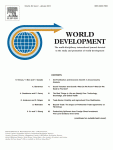FILTER
Displaying 2141 - 2150 of 2674 publications
We use survey data to investigate how urban households in Ethiopia coped with the food price shock in 2008. Qualitative data indicate that the high food price inflation was by far the most adverse…
| Peer Reviewed | Sweden, Ethiopia, Global HubThis study measures the public preferences for cultivated land protection as a case study of Wenling City, China, using the choice experiment (CE) approach. The estimation results indicate that the…
| Peer Reviewed | VietnamCredit risk is perhaps the oldest and most challenging risk for banks. The risk emanates from the probability that borrowers will default on terms of debt, subsequently putting the capital of a bank…
| Peer Reviewed | KenyaDespite the importance of non-wood forest products (NWFPs) in household consumption especially in Nigeria, where 47 million people were unable to meet the 2,900 kcal food requirement in 2004, they…
| Peer Reviewed | NigeriaIn this article we estimate the Value of a Statistical Life and the Value of a Statistical Injury for Chilean workers using a combination of data from the Chilean National Socio-Economic Survey that…
| Peer Reviewed | ChileIn this study, we analyse effort optimisation in common rights-based joint-stock artisanal fisheries when several objectives are pursued by the authorities and the fleets are heterogeneous. The…
| Peer Reviewed | ChileThe informal sector in cities of the developing world is often analyzed from the prism of urban poverty, social exclusion and limited social integration, and lack of power. While such issues have…
| Peer Reviewed | NigeriaThis article examines heterogeneity in the preferences of households regarding participation in a Payments for Ecosystem Services (PES) programme. We argue that such heterogeneity is particularly…
| Peer Reviewed |This paper investigated the short-run causal relationships and the long-run equilibrium relationships among carbon dioxide emissions, economic growth, technical efficiency, and industrial structure…
| Peer Reviewed | Ghana, Global HubThis paper estimates the climate sensitivity of electricity demand in Delhi using daily data on electricity demand and apparent temperature for the period 2000–09. The study adopts a semi-parametric…
| Peer Reviewed | India